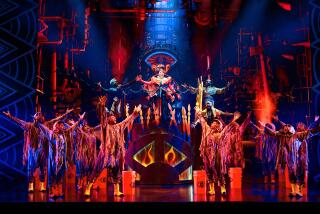Songs of Sisterhood : WISE CHILDREN, <i> By Angela Carter (Farrar, Straus & Giroux: $19.95; 234 pp.)</i>
To begin at the end--and why not, seeing that Angela Carter has written this rambunctious feminist celebration as a kind of music-hall variety show: Here are Dora and Nora Chance dancing and singing on the moonlit pavements of Brixton. Brixton is a raffish South London neighborhood--”on the bastard side of old Father Thames”--where the true Cockney spirit, in exile from the property developers of the East End, fuses with West Indians, Africans, East Asians and Middle Easterners.
Dancing is done any time, any place, but Dora and Nora are 75-year-old twins, long, skinny, violently painted women who once, as music-hall stars, were London’s toast, diners at the Savoy and dance partners of the future former monarch, Edward VIII. Now, their renditions of “I Can’t Give You Anything but Love” and “Is You Is or Is You Ain’t My Baby?” are taking place around a double perambulator occupied by infant twins. These are the illegitimate offspring of their stepnephew, a missionary priest in the Brazilian outback.
Here, then, are two of the five sets of twins that occupy Carter’s wildly subverted saga of a four-generation theater dynasty. Most of them are illegitimate. “It’s a wise child that knows its father,” is the old saying that provides the book’s title. How better to subvert the notion of a dynasty than by making it massively unclear who was in whose bed when. As for the absurdly incessant twinning: how better to poke fun at the male principle of the isolate individual and his wholly owned trail of glory?
The voice, the story, the truth, the lies, the blaring outspokenness and sudden reticence, the garrulous conversational warmth and the dark solitary shiver all belong to Dora. More than what she tells, it is the telling that makes the book; it is character and message.
The story would be impossibly convoluted except that, as in a music-hall comedy, it is required but not important. There was once a great Shakespearean tragedian, Ranulph Hazard, who married Estella--Cordelia to his Lear, Ophelia to his superannuated Hamlet. They had twin sons; or rather, Estella had them by a younger member of the company.
One twin, Melchior, fathered Dora and Nora with the maid at his boardinghouse; he abandoned them and went on to become the great tragedian of his own day. Peregrine, his brother, who made three fortunes and lost two, showered the girls with presents and warming, high-spirited visits. He also fathered Melchior’s children by Melchior’s first wife, Lady Antonia--they are twin girls and nasty. It is not clear who fathered Melchior’s boy twins by his third wife.
Dora and Nora were reared by the owner of the boardinghouse (the mother had died giving birth), a retired stage actress and overflowing personage who was killed in an air raid while going out for more beer. Dora and Nora took dancing lessons, shone in Christmas pantomimes, went on to the musical stage, and eventually joined Melchior, who had ignored them until they became successes, in a vastly popular Shakespearean music-hall show of his own. Thus, the three theater generations. The fourth--Melchior’s and Peregrine’s cloudily begotten offspring--runs thin and goes into television.
Dora inherits her foster mother’s Wife of Bath lustiness, energy and cheerfully devastating views about men and their works. There is war, for example, which the stepmother insists is an invention of old men to eliminate young men in order to make time with young women: “They daren’t be seen to do it themselves, that would give the game away, the mothers wouldn’t stand for it, so all the men all over the world get together and make a deal: You kill off our boys and we’ll kill off yours.”
Old as they are, and with few resources other than their Brixton house--left to them by the foster mother--and Peregrine’s gifts, Dora and Nora are unquenchable. They take care of Melchior’s crippled first wife, Lady Antonia, whom he has cast off and whose daughters have abandoned her. They are devoted but unsentimental. “We’ve been storing Wheelchair in our basement for well nigh 30 years. We’ve got quite attached to her,” Dora relates. They used to take her shopping but: “She nearly starts a riot, she says to the bloke at the salad stall: ‘Have you got anything in the shape of a cucumber, my good fellow?’ After that we had to keep her home for her own sake.”
Dora relates the family’s picaresque history, with its strutting cardboard men and its maltreated but spirited women. Melchior, with all his fame and power, is a poor thing; if Dora has a masculine ideal it is Peregrine. He is dashing, munificent, high spirited and--best of all--he comes and goes.
The book’s climactic scene, which takes place in the present, is the grand reunion to celebrate Melchior’s 100th birthday. Dora, Nora and Wheelchair dress up and go; so does every other member of the brawling family, a flock of celebrities, and 100-year-old Peregrine. Possibly, it is Peregrine’s ghost. Ghost or flesh, he brings along the babies with whom Nora and Dora will renew the family’s cycle.
This final scene, outsize and a touch unearthly, is also overblown. Carter has a penchant for the grand magical set piece, but here, it is protracted, abstract and forced. A long segment set in Hollywood--Dora snuggles up to Scott Fitzgerald and Bertolt Brecht, though they go by other names--makes fairly familiar satire. It is disembodied and umoored.
Carter soars best when her feet are firmly planted on her own soil. On women and age, for example, she is superb. Years ago, Dame Edith Evans was interviewed at 86, and complimented on a recent dazzling stage entrance. “That was not an entrance, that was just me toddlin’ down,” she rejoined. And went on to catalogue her strong points: “My legs are not pretty; they are straight. That, at my age, is something to be grateful for. No bumps and bits and pieces.”
This is the ground from which Carter’s talent springs. Here is Dora exultantly telling of the joint entrance that she and Nora make at Melchior’s party:
“Up the steps we marched in unison, exhibiting our antique but not quite catastrophic legs with wild abandon; with one accord, we stripped off our silver-fox trenches and trailed them behind us, and all the flashes went off at once. I felt quite revived.”
More to Read
The biggest entertainment stories
Get our big stories about Hollywood, film, television, music, arts, culture and more right in your inbox as soon as they publish.
You may occasionally receive promotional content from the Los Angeles Times.










